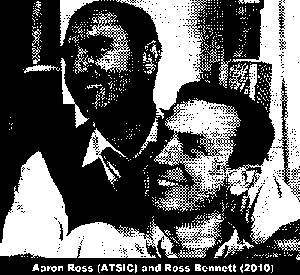

 By
Mary Boson [Sydney Star Observer, 22 January 1998]
By
Mary Boson [Sydney Star Observer, 22 January 1998]
The original inhabitants of Sydney were the Gadigal, Wangal, Bidjgal, Gamaraigal and Eora peoples. It is important that we as the lesbian, gay and transgender communities acknowledge that we are quite literally walking, marching, dancing, shopping and fucking on someone else's land.
When we acknowledge that, we are acknowledging the land theft and dispossession which marks the white history of Australia.
And when we acknowledge that, we begin to make it possible for this to be a shared country marked by respect and a co-operative vision for our future.
This is the essence of reconciliation.
The reconciliation process began when the Royal Commission Into Black Deaths in Custody reported that the deaths would not end unless we acknowledged the generations of disadvantage faced by indigenous people and until we committed to improving their quality of life.
So reconciliation was born. Cross-party support led to a unanimous vote in Federal Parliament in 1991 for reconciliation. The vote also established the Council for Aboriginal Reconciliation. The process is scheduled to end on January 1, 2001, the centenary of Federation.
However, since the Howard Government came to power on the night of the Mardi Gras parade two years ago, it has been openly hostile to the indigenous community. One of it's first acts was to announce an audit of the Aboriginal and Torres Strait Islander Commission (ATSIC). That the audit found that 95 per cent of the organisations reviewed were well-managed has not stopped its blustering.
From its failure to apologise for the stolen generations to its attempts to subvert the High Court Wik judgement Howard and his government have revealed their racism and their paucity of spirit.
The only good thing to have come from this, is that many people have realised the imperative of getting rapt in reconciliation.
The definition of reconciliation varies. For Gina Laurie, the spokeswoman for Queers for Reconciliation it means: "Recognising the dispossession of indigenous people and developing actions and gestures that can be made to try to remedy that."
There are no prescriptions for what an act of reconciliation is. Aaron Ross, a member of the Black, & White and Pink working group (the queer group driving our community's reconciliation response) said: " Reconciliation is about developing practical and sincere interactions between indigenous and non-indigenous people. The form those actions will take is up to non-indigenous people to decide. They are the people with the houses and it is up to them to let us in. "
If not us, then who?
Some people question whether lesbians, gay men and people with transgender qualities should be involved in reconciliation, forgetting that there are indigenous lesbians and gay men, others believe we are ideally placed to make a significant contribution. For sue Green, the answer is simple. "I was at a dinner party one night and a man asked me 'what part of you is Aboriginal'. I answered by saying 'what part of you is gay?'."
Jonathan Parsons, the Mardi Gras festival director believes the queer and indigenous communities both know the sting of discrimination.
"I think we as gay men and lesbians have some empathy about what it feels like to be marginalised by society," he said. "And because of that there is some possibility for us to exchange ideas about how we deal with that marginalisation."
For others, reconciliation is a chance to finally apologise for, and then move on from, our scarred past.
Ross Bennett, the executive officer of the 2010 youth refuge said: "As an organisation we have to get behind the apologies. Even though we weren't around when indigenous children were being stolen, we are the white welfare. And as a sector the white welfare did some atrocious things, so for us that is our starting place."
The PRIDE centre has also opted for a practical approach and has hosted the gay corroboree and now the Blackout forums.
The Sydney 2002 Gay Games also has an extensive outreach program to ensure that indigenous participants are well-represented in the sports and cultural festival.
Bruce Grant of the Lesbian and Gay Anti-Violence Project said that the queer community knows the danger of false stereotypes. "We only have to recall the frightening images presented to us when we were growing up, about who we were, or were about to become.
"The new stereotypes are that the blacks have all the land, the women have all the jobs and the homosexuals have all the rights. Reconciliation is about rejecting stereotypes and embracing the truth."
For the Gay and Lesbian Rights Lobby, getting involved in reconciliation has meant the chance to build political alliances. Co-convenor Sam Levy said: "It is very easy for us as middle-class gays and lesbians to think our issues are separate from everyone else's, But when enough minority groups get together, you have a majority."
ACON is meeting this month to map out concrete steps it will take along the road to reconciliation. ACON president Chris Grattan said: " It is tempting with things like this to just pass a resolution, but we need to really explore what our commitment to reconciliation means."
For the wider lesbian, gay and transgender communities he said reconciliation was a chance to take our place in the centre of issues of national importance and to take a stand with another group of people who have suffered discrimination.
"I think we are all realising that is never safe
for any of us to assume that our freedoms are assured."
|
|
